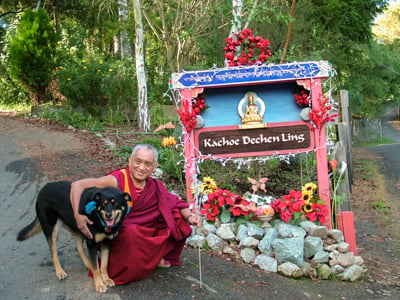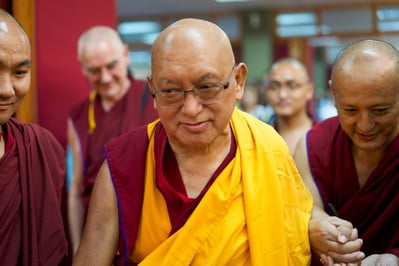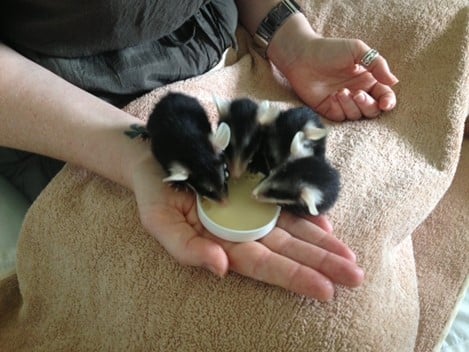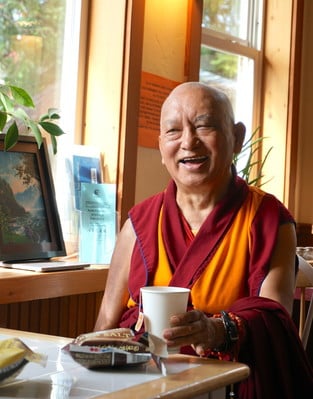My dear one,
How are you? You have been unbelievably excellent for so many years in serving me, doing the offerings, cleaning my rooms and so forth, and the upstairs lights are unbelievable. That you have done this without a break shows your great responsibility and that you are very happy to do it. You are really following the guru with thought and action, with a responsible mind, with a happy mind, and not thinking, “Oh, I have to do this; I have to do that.” You do it without feeling it is a burden and you also have excellent self-discipline. However, the only thing that needs to be developed is compassion for sentient beings. That is the source of happiness for every single hell being, hungry ghost, animal, human being, sura being, asura being and intermediate state being.
It is said in the sutra, Perfectly Contained Holy Dharma of Arya Compassionate One (འཕག་པ་སྤྱན་རས་གཟིགས་གྱི་ཆོས་ཡང་དག་པར་སྡུད་པ་ལས):
If you wish to achieve enlightenment quickly, do not follow many dharmas. Follow one Dharma. What is that? That is great compassion. Whoever has great compassion has all the dharmas of the buddhas in the palm of their hands. They are achieved without effort. In short, great compassion is the root of all Dharma.
You can look at it in the Kangyur.
It is said in the Middle Gomrim [Stages of Meditation by Kamalashila]:
Even if you are standing or even if you are going, you should meditate on great compassion toward sentient beings.
This just mentions two activities as an example, but it means that all our actions—sleeping, eating, working, reading, writing, everything—should be done with compassion. This is the advice. Especially during that time, we ourselves will be at peace and have happiness, other sentient beings won’t receive harm from us and they will receive peace and happiness.
It is said in the first verse of the Eight Verses of Thought Transformation, as you know well:
Determined to obtain the greatest possible benefit
From all sentient beings,
Who are more precious than a wish-fulfilling jewel,
I shall hold them most dear at all times.
This means by cherishing not only the people who help us but even strangers, who neither help nor harm us, and especially by cherishing those whom harm us—of course, bodhicitta is the best of great compassion—what we get from that person is enlightenment, the total cessation of every mistake, every defilement and every subtle negative karma, and the completion of all realizations, sang gyä. That is what we get from that person who we call enemy, who abuses us, who harms us with their body, who harms us with their speech or who harms us with their mind.
As I have mentioned in many advices that were given to others, from every sentient being we receive all the past, present, and future happiness including enlightenment, even the happiness in a dream. I can repeat it again here. From this obscured, suffering sentient being, even the one who we call enemy, great compassion arises, wishing not only to free sentient beings from suffering but to take that responsibility upon ourselves. Then, from there, bodhicitta arises. From bodhicitta, a bodhisattva arises and from a bodhisattva, a buddha arises. A buddha has two actions, one is their own heart’s action and one is within us sentient beings—that is, when we create good karma. So, all our good karma is the buddhas’ actions. Now we can see that from that buddha’s actions, good karma, all the past, present, and future happiness, including enlightenment, happen.
Buddha, Dharma and Sangha, who we take refuge in at the beginning of a practice, cause us to protect our karma, to liberate us from the lower realms, to free us from samsara and to practice the three higher trainings. And not only that, they cause us to achieve enlightenment by freeing us from being caught in the lower nirvana for eons and eons. Then they cause us to generate bodhicitta and practice the six paramitas and so forth. Even these extremely precious ones, Buddha, Dharma and Sangha, come from every sentient being, from our friends, strangers and even from our enemies. Therefore, the numberless buddhas, Dharma and Sangha, from whom we get all these benefits, come from this mosquito, from this tiniest insect near us on the table, in the wood or anywhere. Therefore, these sentient beings are most precious, most kind, most dear, wish-fulfilling for us. Even from this, it makes us think, “How dare I cause unhappiness to them?” There is no way to do that. It is totally opposite—we must cherish them the most. We can see that they are the most important, precious ones in our life.
As it says in that quotation from Gomrim, all day and night our motivation should be compassion. Whatever action we are doing, it is for sentient beings. We need to dedicate it for sentient beings.
The fourth verse of the Eight Verses says:
Whenever I see beings who are wicked in nature
And overwhelmed by negative actions and heavy suffering,
I hold such rare ones dear,
As if I had found a precious treasure.
“Evil in nature” means being very selfish, very ignorant, holding the concept of true existence and also being ignorant of Dharma, of karma, due to the wrong things we regard as right and the right things we regard as wrong. It also means being very impatient, angry, and so forth, having a bad nature.
When someone engages in heavy negative karma—like the heaviest negative karma which arises due to anger or heresy toward one’s own guru, giving up or renouncing the guru, or engaging in the heavy negative karmas of killing one’s father or mother, killing an arhat, drawing blood from a buddha, or causing disunity among the Sangha—by engaging in those heavy negative karmas, they harm themselves and harm others. Then they experience life-threatening diseases, such as leprosy, cancer, [COVID19] virus, AIDS and so forth, anything that is regarded as dangerous.
When we see someone like that, it is like finding a wish-granting treasure, something to cherish, so precious and difficult to find again. That means when we see someone with heavy suffering like this, strong compassion arises. Then, depending on that, bodhicitta arises. Then that makes us achieve enlightenment quickly. So, that is why we should regard those pitiful sentient beings as like having found a wish-granting treasure. By developing compassion, it becomes wish-granting. All our wishes, even our ultimate wishes, succeed quickly.
So, we can see now how that sentient being is most precious for us. It is like finding a diamond in the garbage in our house. Or nowadays, it is like finding a dzi [a type of precious stone or agate bead] in the garbage, from which we can get many millions and millions of dollars. It is like that.
This subject is very important. It is not just to read about very easily. It is to think about well and to feel it, not just reading it, blah, blah, blah, then we are finished. It is not like that. We should feel it and we should realize that every sentient being is most precious. We need to do that, including myself. We have to know that [we can become a] buddha by generating great compassion and bodhicitta, as I mentioned before, for this sentient being, for this tiniest insect, for this very, very tiny insect or for the person who makes us angry or who bothers us.
Buddha made charity of his holy body, his limbs, eyes and head to other sentient beings for three countless great eons. He not only gave his body to the five tigers who were dying in Nepal and later became his disciples in Sarnath when he turned the first Dharma wheel, from where the basic teachings of Buddhism started. Buddha also practiced morality with much hardship for three countless great eons for this tiny insect, even a tick, or for this person who we get angry with or who gets angry with us. Buddha practiced patience for three countless great eons, and he practiced perseverance for eons according to the number of drops of the ocean for this one sentient being to generate bodhicitta and to bring them to enlightenment. He was able to bear hardships and to have perseverance for that sentient being.
Then Buddha practiced meditation for three countless great eons for this sentient being. And he practiced wisdom for three countless great eons for this tiniest being or this human being, this person whom we hate or who hates us, who harms us.
Then, by completing the merits of virtue and the merits of wisdom, by completing the six paramitas, Buddha achieved the rupakaya and dharmakaya, the enlightened holy body and holy mind. He was able to enlighten numberless sentient beings [in the past], is enlightening them now and will enlighten them in the future, including us. That also includes us; Buddha is enlightening us.
All that came from Buddha practicing the six paramitas for three countless great eons for this tiniest insect or for that person. So now Buddha is able to bring us to enlightenment. We have to recognize that. Since Buddha did that, how dare we harm that sentient being? By generating compassion, we should only help them and not harm them. It is impossible to even say bad words or hurting words to that person. We only say pleasing words, only most pleasing words.
Now the numberless buddhas, Dharma, Sangha and all the statues, stupas and scriptures that we read, that we do prostrations to, in order to purify our obscurations and negative karmas and to achieve enlightenment, all this came from where? It came from this tiny insect or this person who we get angry with or who gets angry with us, who harms us. Therefore, their kindness to us is like the limitless sky. So, this is the reality, their kindness.
And this tiniest insect or the person whom we are angry with or who is angry with us, who harms us, who we call enemy, the numberless buddhas and bodhisattvas cherish them the most. They cherish them the most. The numberless buddhas became enlightened for this tiny insect or for this person. And the bodhisattvas are attaining the path to enlightenment for this tiniest insect or this person. They all cherish them the most, as most precious, most kind, wish-fulfilling. Therefore, how dare we hurt them even with words? We can only speak nice, kind, pleasant, sweet words that give them much happiness.
It is said in the teachings of Buddha, and as Nagarjuna explained in Praise to Satisfying Sentient Beings (v. 6):
དེས་ན་སེམས་ཅན་ཕན་པ་བྱས་ན་ང་ལ་མཆོད་པའི་མཆོག །
སེམས་ཅན་གནོད་པ་བྱས་པ་ང་ལ་ཤིན་ཏུ་གནོད་པའི་མཆོག །
བདེ་དང་སྡུག་བསྔལ་ང་དང་སེམས་ཅན་མཚུངས་པར་མྱོང་བས་ན། །
སེམས་ཅན་རྣམས་ལ་འཚེ་བར་བྱེད་དེ་ང་ཡི་སློབ་མ་ཇི་ལྟར་ཡིན། །
Therefore, if you benefit sentient beings, it is the supreme offering to me.
If you harm the sentient beings, it is the supreme extreme harm to me.
Since I and sentient beings experience happiness and suffering in a similar way,
How can those who are harming sentient beings be my disciples?
So here, “I and sentient beings experience happiness and suffering in a similar way” doesn’t mean Buddha has suffering. That would mean Buddha is not free from karma. It is not that. It means that just as we sentient beings want to be happy and free from suffering, Buddha has exactly the same wish for us. Buddha’s compassion and loving kindness for us is a hundred thousand times more than how much compassion and loving kindness we have for ourselves.
So, can you imagine how much Buddha wishes sentient beings to have happiness? It is most unbelievable. Can you imagine how much Buddha wishes us to be free from suffering? It is most unbelievable. You have to understand that. So this quotation is very important. You should know it by heart and remember it in everyday life.
The Bodhicaryavatara (v. 6.113) says:
སེམས་ཅན་རྣམས་དང་རྒྱལ་བ་ལས། །
སངས་རྒྱས་ཆོས་འགྲུབ་འདྲ་བ་ལ། །
རྒྱལ་ལ་གུས་བྱ་དེ་བཞིན་དུ། །
སེམས་ཅན་ལ་མིན་ཅི་ཡི་ཚུལ། །
The qualities of a buddha are accomplished similarly
From sentient beings and the buddhas.
So why do you not respect sentient beings
In the same way that you respect the buddhas?
In the teachings of Nagarjuna, based on the Buddha’s teachings, Praise to Satisfying Sentient Beings (v. 4, lines 1 and 2), it says:
སེམས་ཅན་ཕན་པ་ཆུང་ཡང་དེས་ནི་མཆོད་པ་འབྱུང་འགྱུར་ཏེ། །
གང་གི་ཡིད་ནི་མགུ་བར་བྱེད་པ་མཆོད་པ་ཡིན་པས་སོ། །
Even if the benefit to sentient beings is small, it becomes an offering to the buddhas.
Whatever satisfies the minds of sentient beings becomes an offering.
The commentary says that anyone who satisfies sentient beings’ minds is satisfying the minds of the buddhas. That is why it becomes an offering to the buddhas. That means that if we are able to make sentient beings’ minds happy, that makes the buddhas’ holy minds very happy, and that is why it becomes an offering to them.
The verse continues (lines 3 and 4):
གནོད་པའི་བདག་ཉིད་ཅན་ནམ་གཞན་ལ་རྣམ་པར་འཚེ་བའང་རུང་། །
ལེགས་པར་སྦྱར་ནས་མཆོད་པར་གྱུར་ཀྱང་དེས་ནི་མཆོད་མི་འགྱུར། །
If it is harmful in nature or is harming others,
Even if it is well-prepared and offered, it won’t become an offering.
The commentary says that by harming sentient beings it doesn’t make the buddhas’ minds happy. For example, it is like a mother who feels her son is as precious as her heart, so if we harm that son, it won’t satisfy the loving mother’s mind and will cause the mother’s mind to be unhappy and displeased. Like that, even if we perform hundreds, thousands or millions of unbelievable offerings, very extensive offerings, and offer them to the buddhas, it won’t really become an offering because it doesn’t please the buddhas, just as the loving mother’s mind is displeased when we harm her most beloved child.
The same text (v. 5) also says:
ཆུང་མ་དག་དང་བུ་དང་འབྱོར་དང་རྒྱལ་སྲིད་ཆེན་པོ་དང་། །
ཤ་རྣམས་དང་ནི་ཁྲག་དང་ཚིལ་དང་མིག་དང་ལུས་རྣམས་ཀྱང་། །
གང་ལ་བརྩེ་བའི་དབང་དུ་བྱས་ནས་ང་ཡིས་ཡོངས་བཏང་བ། །
དེས་ན་དེ་ལ་གནོད་པ་བྱས་ན་ང་ལ་གནོད་བྱས་འགྱུར། །
Under the control of compassion, I completely gave away
My wives, sons, wealth and a great king’s reign,
My flesh, blood, fat, eyes and bodies to sentient beings.
Therefore, if you harm them, you are harming me.
Under the control of compassion, Buddha completely gave away his wives, sons, wealth, a great king’s reign, his own flesh, blood, fat, eyes and even his bodies to every sentient being—to every single hell being, every single hungry ghost, every single animal, even the tiniest insect, every single human being, every single sura and asura, and every single intermediate state being. Therefore, if we harm a sentient being, we are harming Buddha.
You need to read more about bodhicitta and meditate on bodhicitta: the seven techniques of Mahayana cause and effect, the shortcomings of the self-cherishing thought and the benefits of cherishing others. The most extensive text is the Wheel of Sharp Weapons. You can read through it and do extensive meditations on the self-cherishing thought.
The short way is to meditate on the eight disadvantages of making mistakes in relation to the guru; all those are shortcomings of the self-cherishing thought. We feel competition toward those who have the same qualities as we do—the same wealth or education or whatever. Toward those who are poorer than us, we feel pride. Toward those who have a higher education and wealth, we feel jealous. This self-cherishing thought makes our life unhappy all the time.
Also, you should meditate on karma. By creating negative karma, such as the ten negative karmas, the ripening result is suffering in the lower realms. In one teaching, it says we get reborn in the lower realms for one hundred eons. Then, there are the three sufferings that we experience when another good karma causes us to be born once again as a human being. Even then there is so much suffering. For example, in the place where we live or where we are born, there is lot of fighting, war, a lot of epidemic diseases and dangers to our life. That is to do with the negative karma of killing.
Then, there is experiencing the result similar to the cause. We experience again other people harming us as we harmed them in the past. Then we create negative karma again according to the past karma. For example, even in a human life, due to the habit, again we do the action of killing—which has the base, thought, action and goal—so again we create the four suffering results. It is said in the lamrim that the four types of sufferings that come from the ten nonvirtues are all the shortcomings of the self-cherishing thought.
As I said before, if we check in our daily life, we will see that the self-cherishing thought is always there, thus our actions do not become beneficial to others, do not become a cause of enlightenment, do not even become a cause to be free from samsara and do not even become a cause of the happiness of future lives. Like that, it is unbelievable, unbelievable, so unbelievable. So especially if we watch our motivation in daily life, we can see how the self-cherishing thought is so harmful all the time.
Then meditate on the benefits of bodhicitta, cherishing others. Read all the benefits of bodhicitta that are explained in Bodhicaryavatara. Also read the book by Kyabje Khunu Lama Rinpoche [The Jewel Lamp: A Praise of Bodhicitta, published as Vast as the Heavens, Deep as the Sea.] Then there are short verses, like the one His Holiness often says after taking the bodhisattva vows.
Whether we are in the city or at home, the minute our motivation becomes the self-cherishing thought, we only think of I, then all the sufferings come. We think, “I have this problem; I have that problem.” We never think of others’ suffering, only ourselves, and that tortures us. We exaggerate it and make it bigger, like a balloon, then we have so much unhappiness. Then we engage in negative karma to get happiness. But all that is totally wrong. It is only creating negative karma, the cause of suffering.
Right away we can see that when our motivation is cherishing others, whether we are in the street or at home, suddenly our mind becomes happy and we can smile at others. When suddenly we think, “The purpose of my life is that I’m here to serve other sentient beings,” then we have so much happiness. Then we can smile at others. Before, with the self-cherishing thought, we squeezed our face. It became wrinkled. Others can see from our face that we have so much concern for our own problems. We can see the function of the self-cherishing thought, like that.
Regarding some of the difficulties with people at the center, I gave you all the reasons why you should respect sentient beings the same as you respect the Buddha, as it says in Bodhicaryavatara. I mentioned many quotations, for example, how by making sentient beings happy that becomes the best offering to the buddhas. We should do that even for the beggars, for anybody.
I think that’s all. Thank you very, very much. Thank you.



























 As soon as I got back, I took them to the nun and she took charge of the situation. We went to the office and the kind staff members found a syringe to feed them. We had to break our silence, and so did several other people who helped us. We decided that saving the lives of these four sentient beings was far more important that keeping silent! So we settled into a routine of taking turns to look after them. They had to be fed every two to three hours throughout the day and night, so we shared the job with a few other people who wanted to help….
As soon as I got back, I took them to the nun and she took charge of the situation. We went to the office and the kind staff members found a syringe to feed them. We had to break our silence, and so did several other people who helped us. We decided that saving the lives of these four sentient beings was far more important that keeping silent! So we settled into a routine of taking turns to look after them. They had to be fed every two to three hours throughout the day and night, so we shared the job with a few other people who wanted to help….







